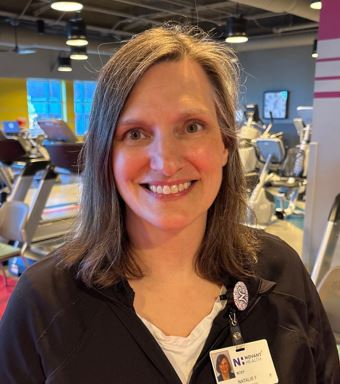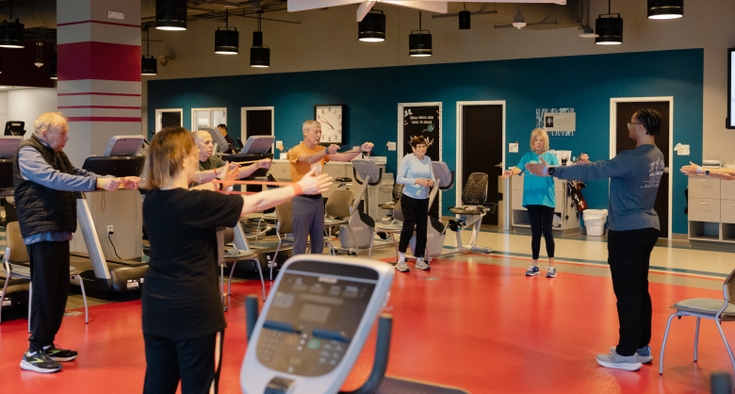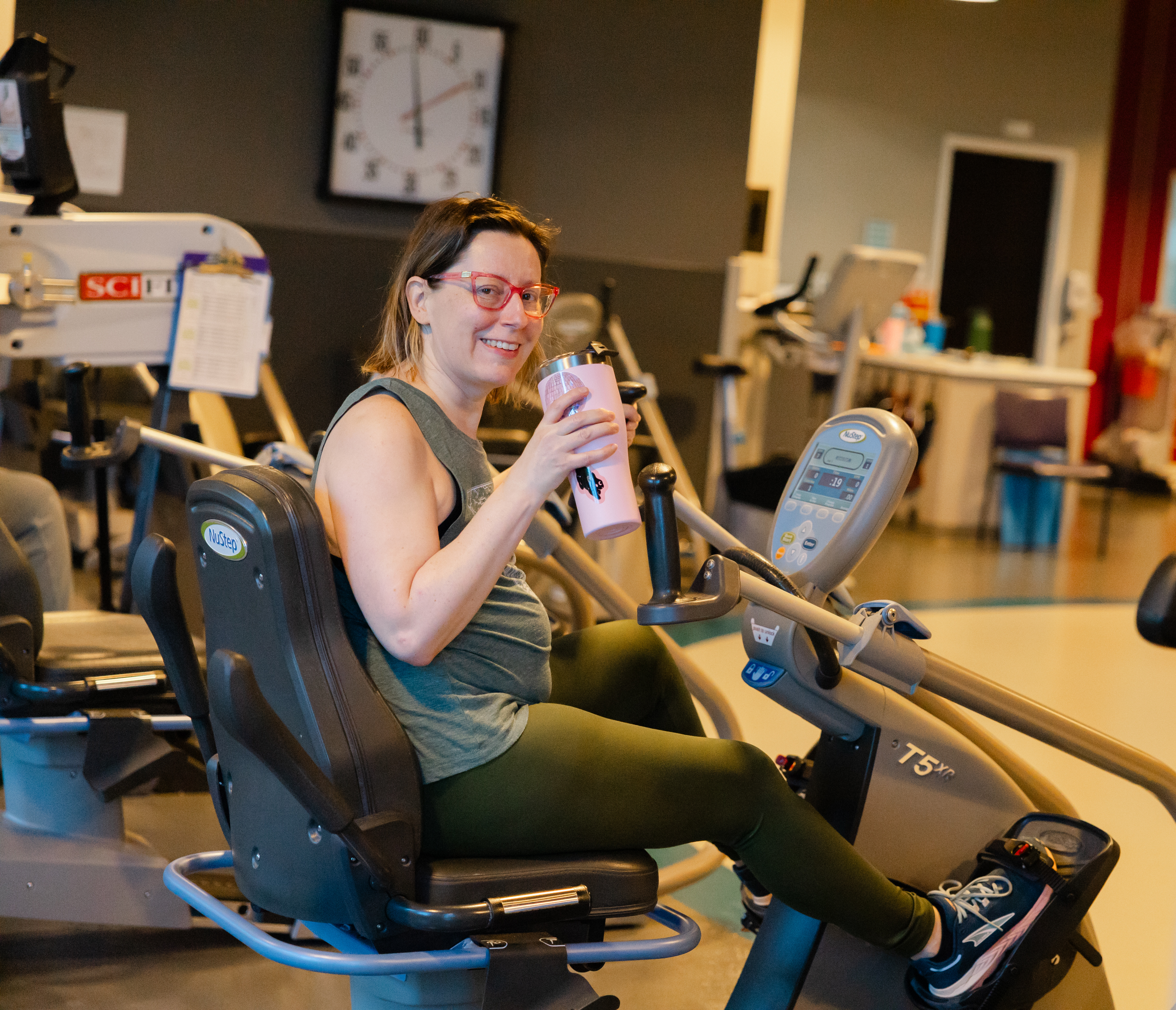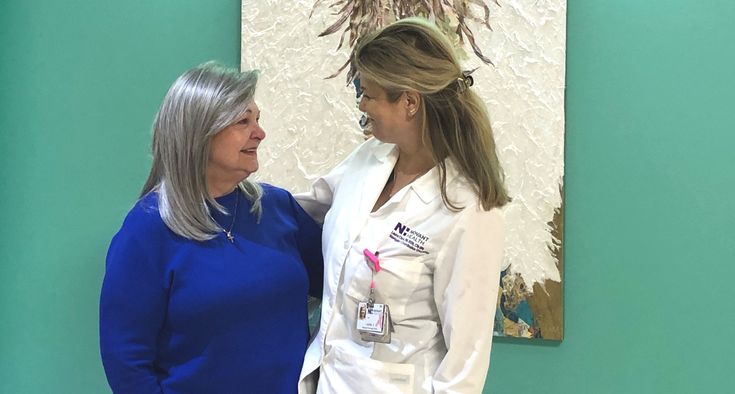
If you’re navigating cancer and the side effects of treatment, exercising may be the last thing you want to do. But the right kind of movement can actually help you feel better, exercise physiologist Natalie Fulton said.
Fulton helps cancer survivors preserve their function, get stronger, improve their outcomes and lower their risk of future disease through Novant Health’s Cancer Wellness Program in Charlotte. Here are some common questions people often ask.
Why should someone battling cancer exercise? Aren’t they dealing with enough already?
One of the worst symptoms people experience during and after cancer treatment is fatigue. Exercise fights fatigue.
Find the cancer care you deserve.
Doesn’t exercise make you more tired?
Not if it’s done safely, with a focus on maintaining your function and energy.
Before cancer, a lot of your base level of fitness came from going about your day: washing your clothes. Going to work. Mowing your lawn. If you exercised on top of your daily activities, that made you even more fit.
During treatment, you’re not doing as many of those daily activities, and you’re devoting more time to resting, sleeping and appointments. Being less active over weeks, months or a year has a huge effect on your physical fitness. Then the side effects of treatment are layered on top of that.
If you needed surgery, you’ve lost physical strength and possibly introduced some new strength imbalances. You may have even had to stop or curtail whatever exercise you were doing. Because you’re weaker, daily activities are more draining, so you do fewer activities and become even weaker. This becomes a vicious cycle, making it hard for you to return your pre-disease state.
In contrast, if you maintain as much movement as feasible and keep that base level of fitness during treatment, you have less of a hole to dig out of at the end. Many participants find they gain strength and energy during the course of their participation, but our first goal is to preserve that baseline.
Does exercise help with energy day-to-day, or is it more of a long game?

Our goal for each workout session is that participants leave feeling better and more energetic than they did when they came in.
It takes trial and error on their part to determine how to safely expend energy while not exhausting themselves too much. We have everyone record their fatigue level before starting the session. We work on energy management and helping them pay attention to how the intensity of their exercise affects that fatigue level. They learn that sometimes, harder is not better and it can actually result in higher fatigue.
Once participants have been through our program, they have a better quality of life day-to-day because they're able to moderate their energy expenditure more effectively. And because their baseline level of fitness is higher, daily tasks don’t drain as much of their energy reserve.
Are there other reasons to exercise while being treated for cancer?
Exercise boosts mood and lowers anxiety and stress. It also improves your body image and self-esteem, which is helpful when you’re dealing with hair loss, the loss of a body part, weight gain or loss, or other body changes.
Every cancer survivor has a risk of recurrence or developing another unrelated cancer, and some cancer treatments increase your risk of cardiovascular disease. This is scary, but if you exercise, you can counteract some of that increased risk. And if you do get any of these illnesses, you’ll have a better outcome if you come into it physically stronger.
We also see great social and emotional benefits to exercising with people who have already been where you are right now — which is why we offer group classes. It’s encouraging to see someone further down the treatment road than you, and reassuring to see that things do get better and that there are things you can actively do to make that happen.
Although no one has the same exact diagnosis or treatment plan, everyone will understand how you might look perfectly fine on the outside but don’t feel good on the inside, or why you’re more emotionally fragile today than last week. It feels good to be understood.
At what point in the cancer journey is it safe to exercise?
Exercise is encouraged throughout the cancer journey but should be modified based on current symptoms and side effects. Our program serves the entire spectrum of adults with cancer, from the newly diagnosed to in-the-thick-of-treatment to post-treatment. Some women who have not been diagnosed with cancer but are identified as high risk due to genetic mutations sometimes opt for preventive removal of their breasts and reproductive organs to reduce their risk; we also help these women start or resume exercise safely after that surgical intervention.
Our Cancer Wellness exercise sessions are medically supervised by a registered nurse and clinical exercise physiologists with oncology-specific certifications. We tailor exercise to each person’s health status and fitness level, and help them progress as their fitness improves.
Conversely, we help them scale back their exercise level if the severity of their side effects is fluctuating. The path to fitness is not always linear so we guide them through this process to avoid increasing fatigue or risk of injury, and to increase their confidence when exercising independently.
If you choose not to exercise with us, it’s ideal to work with someone who has studied exercise physiology for people with chronic conditions and understands how cancer and its various treatments can affect the ability of your body to adapt to exercise. Share details of your cancer treatment with them; this information is vital for determining any cancer-specific risks for exercise and for safe and effective exercise programming. Don’t just assume generic workout advice applies to you — it probably does not.
What does a cancer-safe workout include?
At our program, we start each session by checking baseline vital signs to make sure you are safe to exercise that day. We warm up gradually to properly prepare the body for higher exertion. We strength-train with weights to build strength and restore lost muscle mass, offering modifications for reduced range of motion, other orthopedic limitations or bone metastases.
We perform cardiovascular exercise within a target heart range that represents moderate exercise for you specifically. We do flexibility exercises to preserve or increase range of motion. At the end of the session we do a cooldown to ensure you return to your baseline vitals.
How can someone learn more about Novant Health’s Cancer Wellness Program?
Cancer Wellness is offered to patients in the Charlotte, Triad and North Carolina coastal regions. Clinicians can refer their patients through our medical record system (keep reading for more details). This program is not covered by insurance, but Novant Health cancer patients are covered by scholarships.
We offer a three-month wellness program at many locations that can be completed in-person or remotely at any point during your cancer journey. After you’ve completed that, some of our locations have a maintenance program you can do as long as you want (for a monthly fee). We also have a program focused on prehab — helping you get stronger before surgery.
I really love to see the transformations people undergo while they’re in our program, both physical and emotional. It is so gratifying to see their improvements and how the right exercise and support changes them in so many ways for the better.
Call 704-384-5223 to learn about programming at Novant Health Cancer Institute Kemp Bessant Support Center.
Why nutrition and education are also ‘medicine’

Exercise isn’t the only thing the Cancer Wellness Program offers: Weekly educational sessions explore nutrition, exercise, psychosocial and medical management topics that impact survivorship — all focused on the needs of cancer patients.
Cancer treatments almost always affect a patient’s nutritional status regarding appetite, taste preferences, energy, blood sugar, muscle and bone mass and/or weight management.
Cancer Wellness classes have their own registered dietitian to provide nutrition education, meal plans and nutrition consultations to make sure you are meeting your nutritional needs and managing any treatment-related side effects or symptoms that impact your nutritional status. This is just one more resource to help you be your strongest.
Doctors and other providers can place a referral to REF282 to any of the following locations based on patient preference:
Presbyterian Medical Center Cancer Wellness - Charlotte
Huntersville Medical Center Cancer Wellness - Huntersville
Matthews Medical Center Cancer Wellness - Matthews
Brunswick Medical Center Cancer Wellness - Brunswick
Thomasville Medical Center Cancer Wellness - Thomasville
Rowan Medical Center Cancer Wellness - Salisbury
Forsyth Medical Center Cancer Wellness - Winston-Salem










